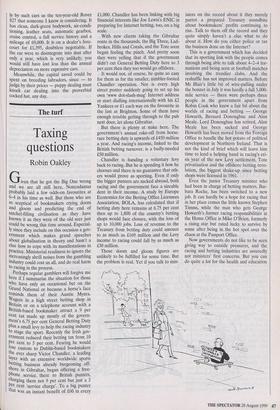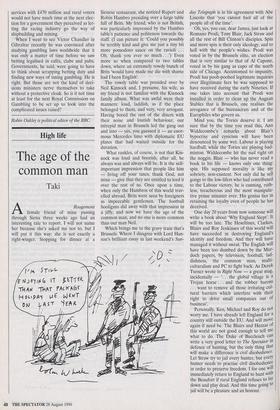The turf
Taxing questions
Robin Oakley
Perhaps regular gamblers will forgive me here if I summarise the situation for those who have only an occasional bet on the Grand National or because a horse's face reminds them of their Auntie Mynra. Wagers in a high street betting shop in Britain or on a telephone account with a British-based bookmaker attract a 9 per cent tax made up mostly of the govern- ment's 6.75 per cent General Betting Duty Plus a small levy to help the racing industry to stage the sport. Recently the Irish gov- ernment reduced their betting tax from 10 per cent to 5 per cent. Fearing he would lose custom to Dublin-based bookmakers the ever sharp Victor Chandler, a leading layer with an extensive worldwide sports betting business already burgeoning off- shore in Gibraltar, began offering a free- Phone service, there to British punters, Charging them not 9 per cent but just a 3 Per cent 'service charge'. To a big punter that was an instant benefit of £60 in every £1,000. Chandler has been linking with big financial interests like Joe Lewis's ENIC in preparing for Internet betting, too, on a big scale.
With new clients taking the Gibraltar route in the thousands, the Big Three, Lad- brokes, Hills and Corals, and the Tote soon began feeling the pinch. And pretty soon they were yelling that if the government didn't cut General Betting Duty here to 3 per cent then they too would go offshore.
It would not, of course, be quite so easy for them as for the smaller, nimbler-footed Chandler operation. Nor is every high street punter suddenly going to set up his own `www dot-slash-mug' Internet address or start dialling internationally with his £2 Yankees or £1 each way on the favourite in the last at Brighton. Some of them have enough trouble getting through to the pub next door, let alone Gibraltar.
But there is plenty at stake here. The government's annual rake-off from horse- race betting duty is upwards of £450 million a year. And racing's income, linked to the British betting turnover, is a badly-needed £50 million.
Chandler is handing a voluntary levy back to racing. But he is spending it how he chooses and there is no guarantee that oth- ers would prove as sporting. Even if only the bigger punters are sucked abroad, both racing and the government face a sizeable dent in their income. A study by Europe Economics for the Betting Office Licensees Association, BOLA, has calculated that if betting duty here remains at 6.75 per cent then up to 1,800 of the country's betting shops would face closure, with the loss of up to 10,000 jobs. Loss of revenue to the Treasury from betting duty could amount to as much as £169 million and the Levy income to racing could fall by as much as £30 million.
Those doom and gloom figures are unlikely to be fulfilled for some time. But the problem is real. Yet if you talk to min- isters on the record about it they merely parrot a prepared Treasury soundbite about bookmakers' profits continuing to rise. Talk to them off the record and they quite simply haven't a clue what to do about it. How do you either police or tax the business done on the Internet?
This is a government which has decided that its sporting link with the people comes through being able to talk about 4-2-4 for- mations and being seen at football matches involving the trendier clubs. And the reshuffle has not improved matters. Before Mr Blair's little bit of wire-pulling under the bonnet in July it was hardly a full 5,000- mile service — there were perhaps three people in the government apart from Robin Cook who knew a fair bit about the worlds of racing and betting — George Howarth, Bernard Donoughue and Alan Meale. Lord Donoughue has retired, Alan Meale has been sacked and George Howarth has been moved from the Foreign Office to handle the hot potato of political development in Northern Ireland. That is not the kind of brief which will leave him time to lend a helping hand in racing's cri- sis year of the new Levy settlement, Tote privatisation and the offshore betting revo- lution, the biggest shake-up since betting shops were licensed in 1961.
Even the junior Treasury minister who had been in charge of betting matters, Bar- bara Roche, has been switched to a new job. It can hardly be a hope for racing that in her place comes the little known Stephen Timms, while the man who gets George Howarth's former racing responsibilities at the Home Office is Mike O'Brien, formerly a rising star but rated lucky to survive by some after being in the hot spot over the chaos at the Passport Office.
Now governments do not like to be seen giving way to outside pressures, and the racing and betting industries are assuredly not ministers' first concerns. But you can do quite a lot for the health and education services with £470 million and rural voters would not have much time at the next elec- tion for a government they perceived as let- ting the racing industry go the way of shipbuilding and mining.
When I went to see Victor Chandler in Gibraltar recently he was convinced after studying gambling laws worldwide that it was only a matter of time before we saw betting legalised in cafés, clubs and pubs. Governments, he said, were going to have to think about scrapping betting duty and finding new ways of taxing gambling. He is right. But those are not the kind of deci- sions ministers nerve themselves to take without a protective cloak. So is it not time at least for the next Royal Commission on Gambling to be set up to look into the complicated issues raised?
Robin Oakley is political editor of the BBC.



























































 Previous page
Previous page